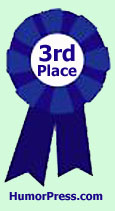As Richard drove, he passed I-74 and saw a sign announcing it was 112 miles to Indianapolis, Indiana. He thought about what he always thought about when he saw a sign for Indiana: Puerto Rico. He felt, as the United States bumbled through its third century of existence, several states had lost their mojo, Indiana surely among them. Its citizens wanted to leave to pursue other opportunities—not physically per se. Conceptually. The northwest corner of the state longed to be part of Chicago; the southern third, the Confederacy; and Indianapolis, the ranks of major metropolitan areas with beer vended on Sundays. Every license plate in the state proclaimed it to be “The Crossroads of America,” a tacit acknowledgement that those traveling to Indiana had no intention of staying. The Indiana flag has 19 stars, a nod to the 18 states that joined the Union before it. (We’re #19!)
Puerto Rico had one star on its flag, just like Texas. One star sends a message: We are proud, independent, and not to be messed with. Richard had never been to Puerto Rico, but it appeared to have mojo to spare. He was in Manhattan for an Organic Chemistry Society of America conference one June—the one when the plebiscite on creating an officer-level position to act as a liaison with the American Association for Non-Organic Chemistry Science was rejected decisively—when he decided it was time to skip the breakout group on “Teflon and the Future of Self-Defense,” go outside the convention center, and buy lunch from a cart.
A block away toward Fifth Avenue he saw a large crowd lining the street waving American flags and singing. Parade floats glided by. Curious, he walked towards the crowd and discovered the red, white and blue flags were actually Puerto Rican, as was the crowd, as was the pink crabmeat-stuffed, garlic-seasoned fried plantain he bought from a street vendor. It was unexpectedly tasty and a welcome departure from forlorn hot dogs available on all four street corners of every intersection in Midtown. Swept up by the unabashed pride and fortified by something resembling a banana milkshake spiked with rum, he spent the rest of the afternoon watching, then waving. By late afternoon, he was cheering along with the multitudes.
Walking back to the conference, he felt buoyant having participated in a culture that was not his and until then, had never penetrated his consciousness. At a cocktail party with fellow conventioneers the following night, the issue of Puerto Rican statehood arose, as someone had noticed photographs of the parade below the fold on the front page of the Times. Richard did not take a side, but said if the Puerto Ricans wanted in, it was fine by him.
Now, driving his car, it occurred to him that if Puerto Rico was granted gold-card status, there would be 51 states, and thus the need for another star on the American flag. Five rows of ten would have to be retired to accommodate another configuration. Three by seventeen was the obvious choice, but that would encroach on the red and white stripes on the top right corner of the flag. Or the stars could be shrunk to fit within the boundaries of the existing blue background. Neither option seemed to trumpet the majesty of a great nation. Fifty-two states would be marginally better (four by thirteen stars), but he couldn’t think of a plausible candidate for the 52nd state. Legislation to admit the U.S. Virgin Islands wouldn’t survive a Republican filibuster and he wasn’t confident that lawmakers, Democrat or Republican, could find Guam on a map. And admitting both would be out of the question since those plus Puerto Rico would total 53 states, a prime number. The stars grouped together would be necessarily asymmetrical. The alternative would have the 53 stars placed on the perimeter of the flag, but this conjured images of Evel Knievel in full regalia.
Fifty was clearly best, so if Puerto Rico was in, then somebody else was out. Why not Indiana? Richard would never advocate for Indiana to be expelled from the nation altogether. But a conversion to a commonwealth would keep the ledger in balance. He was not sure if the natives would notice and if they did, he could not imagine a protest more heated than resigned sighs and a spike in the purchase of RVs.
